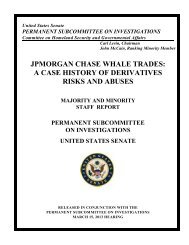JPMORGAN CHASE WHALE TRADES: A CASE HISTORY OF DERIVATIVES RISKS AND ABUSES
JPMORGAN CHASE WHALE TRADES: A CASE HISTORY OF DERIVATIVES RISKS AND ABUSES
JPMORGAN CHASE WHALE TRADES: A CASE HISTORY OF DERIVATIVES RISKS AND ABUSES
Create successful ePaper yourself
Turn your PDF publications into a flip-book with our unique Google optimized e-Paper software.
262<br />
operate the company. … [W]e admit it, we will learn from it, we will fix it, we<br />
will move on, hopefully in the end, it will make us a better company.” 1472<br />
In response to questions during the call, Mr. Dimon also said:<br />
“You should assume that we try to keep our readers update[d] about what we<br />
know and when we know it and it’s just a constant practice of the company. And<br />
when I said, it was caught, we started [to] dig into this more and more, most of the<br />
things were bearing big losses in the second quarter. And of course, when you<br />
start to see something like that you act probably – obviously we should have acted<br />
sooner.<br />
[Analyst question]: [W]hen did the losses accumulate? [W]as this something that<br />
happened most recently or this was an era in the past and is just updating your risk<br />
amount now?<br />
[Mr. Dimon]: There were small ones in the first quarter, but real ones that we<br />
talked about the $2 billion were all in the second quarter. And it kind of grew as<br />
the quarter went on. And obviously it got our attention, that and other things,<br />
which came to our attention.” 1473<br />
In July, the bank restated its earnings to increase its first quarter losses attributed to the SCP by<br />
1474<br />
$660 million, which the bank said fell to $459 million after taxes.<br />
B. Securities Laws<br />
To ensure fair, open and efficient markets for investors, federal securities laws impose<br />
specific disclosure obligations on market participants. Under Securities and Exchange<br />
Commission Rule 10b-5 1475 and Section 17(a) of the Securities Act of 1933, 1476<br />
it is against the<br />
law for issuers of securities to make untrue statements or omissions of material facts in<br />
connection with the sale or purchase of securities. In the JPMorgan Chase case study examined<br />
by the Subcommittee, the bank, as an issuer, has made disclosures that raise significant concerns<br />
about the accuracy of the information it provided to investors and about omissions of key<br />
information.<br />
1472<br />
5/10/2012 “Business Update Call,” JPMorgan Chase transcript, at 2-3, http://i.mktw.net/_newsimages/pdf/jpmconference-call.pdf.<br />
1473<br />
Id. at 4.<br />
1474<br />
7/13/2012 JPMorgan Chase & Co., Form 8-K,<br />
http://files.shareholder.com/downloads/ONE/1934577619x0x582872/d38931ff-a849-41ed-a804a94aff313272/Restatement_8-K_Cover.pdf<br />
(“On July 13, 2012, JPMorgan Chase & Co. reported that it will restate<br />
its previously-filed interim financial statements for the first quarter of 2012. The restatement will have the effect of<br />
reducing the Firm’s reported net income for the 2012 first quarter by $459 million (after-tax). The restatement<br />
relates to valuations of certain positions in the synthetic credit portfolio of the Firm’s Chief Investment Office.”).<br />
1475<br />
SEC Rule 10b-5 makes it unlawful to “make any untrue statement of a material fact or to omit to state a material<br />
fact necessary in order to make the statements made, in the light of the circumstances under which they were made,<br />
not misleading.” 17 CFR Section 240.10b-5(b) (2011), adopted by the SEC pursuant to Section 10(b) of the<br />
Securities Exchange Act of 1934 (“Exchange Act”), 15 U.S.C § 78(j)(b) (2006).<br />
1476<br />
15 U.S.C. § 77q(a) (1976).



